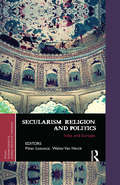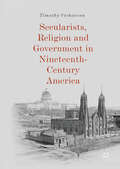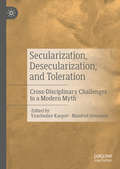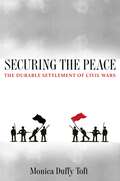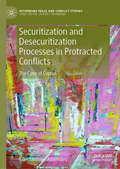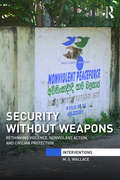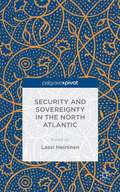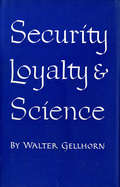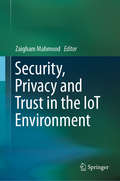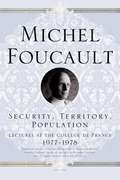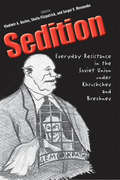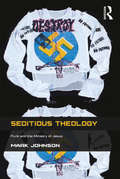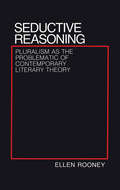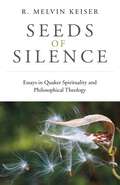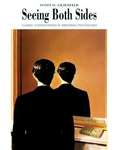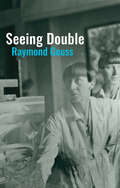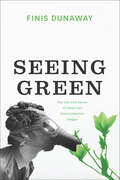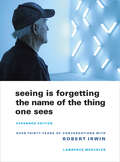- Table View
- List View
Secularism, Religion, and Politics: India and Europe (Ethics, Human Rights and Global Political Thought)
by Péter Losonczi Walter Van HerckThis book highlights the relationship between the state and religion in India and Europe. It problematizes the idea of secularism and questions received ideas about secularism. It also looks at how Europe and India can learn from each other about negotiating religious space and identity in this globalised post-9/11 world.
Secularists, Religion and Government in Nineteenth-Century America
by Timothy VerhoevenThis book shows how, through a series of fierce battles over Sabbath laws, legislative chaplains, Bible-reading in public schools and other flashpoints, nineteenth-century secularists mounted a powerful case for a separation of religion and government. Among their diverse ranks were religious skeptics, liberal Protestants, members of minority faiths, labor reformers and defenders of slavery. Drawing on popular petitions to Congress, a neglected historical source, the book explores how this secularist mobilization gathered energy at the grassroots level. The nineteenth century is usually seen as the golden age of an informal Protestant establishment. Timothy Verhoeven demonstrates that, far from being crushed by an evangelical juggernaut, secularists harnessed a range of cultural forces—the legacy of the Revolutionary founders, hostility to Catholicism, a belief in national exceptionalism and more—to argue that the United States was not a Christian nation, branding their opponents as fanatics who threatened both democratic liberties as well as true religion.
Secularization, Desecularization, and Toleration: Cross-Disciplinary Challenges to a Modern Myth
by Manfred Svensson Vyacheslav KarpovThis book challenges the modern myth that tolerance grows as societies become less religious. The myth inseparably links the progress of toleration to the secularization of modern society. This volume scrutinizes this grand narrative theoretically and empirically, and proposes alternative accounts of the varied relationships between diverse interpretations of religion and secularity and multiple secularizations, desecularizations, and forms of toleration. The authors show how both secular and religious orthodoxies inform toleration and persecution, and how secularizations and desecularizations engender repressive or pluralistic regimes. Ultimately, the book offers an agency-focused perspective which links the variation in toleration and persecution to the actors of secularization and desecularization and their cultural programs.
Securing the Peace: The Durable Settlement of Civil Wars
by Monica Duffy ToftTimely and pathbreaking, Securing the Peace is the first book to explore the complete spectrum of civil war terminations, including negotiated settlements, military victories by governments and rebels, and stalemates and ceasefires. Examining the outcomes of all civil war terminations since 1940, Monica Toft develops a general theory of postwar stability, showing how third-party guarantees may not be the best option. She demonstrates that thorough security-sector reform plays a critical role in establishing peace over the long term. Much of the thinking in this area has centered on third parties presiding over the maintenance of negotiated settlements, but the problem with this focus is that fewer than a quarter of recent civil wars have ended this way. Furthermore, these settlements have been precarious, often resulting in a recurrence of war. Toft finds that military victory, especially victory by rebels, lends itself to a more durable peace. She argues for the importance of the security sector--the police and military--and explains that victories are more stable when governments can maintain order. Toft presents statistical evaluations and in-depth case studies that include El Salvador, Sudan, and Uganda to reveal that where the security sector remains robust, stability and democracy are likely to follow. An original and thoughtful reassessment of civil war terminations, Securing the Peace will interest all those concerned about resolving our world's most pressing conflicts.
Securities Against Misrule
by Jon ElsterElster proposes a normative theory of collective decision making, inspired by Jeremy Bentham but not including his utilitarian philosophy. The central proposal is that in designing democratic institutions one should reduce as much as possible the impact of self-interest, passion, prejudice and bias on the decision makers, and then let the chips fall where they may. There is no independently defined good outcome that institutions can track, nor is there any way of reliably selecting good decision makers. In addition to a long initial chapter that surveys theories of collective decision making, notably social choice theory, and a chapter expounding and discussing Bentham's views, historical chapters on the jury, constituent assemblies and electoral systems develop and illustrate the main ideas. This work draws on a welter of case studies and historical episodes, from Thucydides and Plutarch to the present. It is also grounded in psychology, behavioral economics and law.
Securitization and Desecuritization Processes in Protracted Conflicts: The Case of Cyprus (Rethinking Peace and Conflict Studies)
by Constantinos AdamidesUsing the Cyprus conflict as a case study, this book examines how the securitization process in protracted conflict environments changes, as it becomes routinized and potentially even institutionalized. Furthermore, the process is not limited to the mainstream top-down path, as it also follows a horizontal and even bottom-up direction, which inevitably has an impact on the goals and securitization options of both the mainstream securitizing actors and the audience(s). Lastly, on a theoretical level it examines how the multi-directional securitization forces have an impact on the elite and audience-driven desecuritization efforts and ultimately on the prospects for conflict resolution. The book’s case study, the Cyprus question, offers an alternative reading of the forces dominating the specific conflict, while concurrently offers a useful framework for the study of similar protracted and deeply securitized conflicts.
Security Without Weapons: Rethinking violence, nonviolent action, and civilian protection (Interventions)
by M. S. WallaceFew questions of global politics are more pressing than how to respond to widespread violence against civilians. Despite the efforts of Responsibility to Protect (R2P) proponents to draw attention away from exclusively military responses, debates on humanitarian intervention and R2P’s “Third Pillar” still tend to boil down to two unsatisfying options: stand by and “do nothing” or take military action to protect civilians – essentially using violence to stop violence. Accordingly – and given disagreement and uncertainty regarding moral claims, as well as the unpredictability of military effectiveness – this book asks: how can we counter violence ethically and effectively, taking action consistent with our particular moral commitments while also nurturing difference and enacting responsibility towards multiple others? After evaluating the pragmatic and ethical failings of military action, the book proposes nonviolent intervention as a third – unarmed, on-the-ground – option for protecting civilians during humanitarian crises. In the empirical section of the book, focusing on the discursive and psychological conditions enabling violence, Wallace analyses the mechanisms by which Nonviolent Peaceforce – an international NGO engaged in nonviolent intervention/ unarmed civilian peacekeeping (UCP) – was able to protect civilians and prevent violence, even if on a limited scale, in the broader context of Sri Lanka’s war/counterinsurgency in 2008. Both philosophically innovative and practically useful to those working in the field, the book contributes to a range of literatures and debates: from just war theory and poststructuralist ethics to nonviolent action and conflict transformation, and from humanitarian intervention, R2P, and civilian protection to strategic theory and discursive and psychological theories of violence.
Security Without Weapons: Rethinking violence, nonviolent action, and civilian protection (Interventions)
by M. S. WallaceFew questions of global politics are more pressing than how to respond to widespread violence against civilians. Despite the efforts of Responsibility to Protect (R2P) proponents to draw attention away from exclusively military responses, debates on humanitarian intervention and R2P’s “Third Pillar” still tend to boil down to two unsatisfying options: stand by and “do nothing” or take military action to protect civilians – essentially using violence to stop violence. Accordingly – and given disagreement and uncertainty regarding moral claims, as well as the unpredictability of military effectiveness – this book asks: how can we counter violence ethically and effectively, taking action consistent with our particular moral commitments while also nurturing difference and enacting responsibility towards multiple others?After evaluating the pragmatic and ethical failings of military action, the book proposes nonviolent intervention as a third – unarmed, on-the-ground – option for protecting civilians during humanitarian crises. In the empirical section of the book, focusing on the discursive and psychological conditions enabling violence, Wallace analyses the mechanisms by which Nonviolent Peaceforce – an international NGO engaged in nonviolent intervention/ unarmed civilian peacekeeping (UCP) – was able to protect civilians and prevent violence, even if on a limited scale, in the broader context of Sri Lanka’s war/counterinsurgency in 2008.Both philosophically innovative and practically useful to those working in the field, the book contributes to a range of literatures and debates: from just war theory and poststructuralist ethics to nonviolent action and conflict transformation, and from humanitarian intervention, R2P, and civilian protection to strategic theory and discursive and psychological theories of violence.
Security and Defence: Ethical and Legal Challenges in the Face of Current Conflicts (Advanced Sciences and Technologies for Security Applications)
by Juan Cayón PeñaThis book aspires to face the challenge of analyzing with due academic rigor, always in the paradigm of security and advanced sciences, but without forgetting the ethical questions that our world raises every day. The work is divided into two main sections: the first section is focused on the cyber world, with not only technical but also legal derivations given the expansion of vulnerabilities and our technological dependence. The second section, with a more interdisciplinary nature, runs through undeniably topical issues such as territorial problems and the potential decline of the traditional States, the communicational impact of information management and false news, or the commitment to essential freedoms for the West. This book connects advanced technologies and ethical issues and includes discussions on recent crises such as COVID-19. It also provides an interdisciplinary view on the ethical issues for security technologies.
Security and Sovereignty in the North Atlantic
by Lassi HeininenThe North Atlantic continues to be an area of international strategic significance regionally and globally. This study explores the strong processes of sovereignty, as well as new independent states and micro-proto-states that are forming in the region.
Security, Defense Discourse and Identity in NATO and Europe: How France Changed Foreign Policy (New International Relations)
by Falk OstermannAnalyzing changes in the role and place of NATO, European integration, and Franco-American relations in foreign policy discourse under Presidents Jacques Chirac and Nicolas Sarkozy, this book provides an original perspective on French foreign policy and its identity construction. The book employs a novel research design for the analysis of foreign policies, which can be used beyond the case of France, by combining the discourse theory of the Essex School with Interpretive Policy Analysis to examine political ideas and how they are organized into a foreign policy identity. On these grounds, the volume undertakes a comparative analysis of parliamentary and executive discourse of President Chirac’s failed attempt at NATO reintegration in the 1990s, Sarkozy’s successful attempt in the 2000s, and the Libyan War. Ostermann depicts French foreign policy and identity as turning away from the European Union, atlanticizing, and losing its American nemesis. As a result, France uses a much more pragmatic, de-unionized, and pro-American strategy to implement foreign policy objectives than before. Offering a new and innovative explanation for a major change in French foreign policy and grand strategy, this book will be of great interest to scholars of NATO, European defense cooperation, and foreign policy.
Security, Loyalty, and Science (Cornell Studies in Civil Liberties)
by Walter GellhornBoth sides of a sensitive problem are assessed by Professor Gellhorn in this penetrating analysis of national security and its effect upon scientific progress.The costs and advantages of secrecy in certain areas of science and the conflict between national safety and individual rights in the administration of our federal loyalty program are presented; all the arguments are objectively weighed. The book answers such questions as: Can young scientists be well trained when publication and teaching are not free? Have we gone far enough-or too far-in avoiding "security risks" in important scientific establishments? How does the federal drive against "potentially disloyal" persons actually work? Do "fear of the smear" and crude methods discourage public service by American scientists?This study, a unit of an investigation of control of subversive activities supported by grants from the Rockefeller Foundation, is based upon two years of research and numerous field interviews of scientists, administrators, defense officials, and educators. Security, Loyalty, and Science is a volume in the series Cornell Studies in Civil Liberty, of which Robert E. Cushman is advisory editor.
Security, Privacy and Trust in the IoT Environment
by Zaigham MahmoodThe Internet of Things (IoT) is a network of devices and smart things that provides a pervasive environment in which people can interact with both the cyber and physical worlds. As the number and variety of connected objects continue to grow and the devices themselves become smarter, users’ expectations in terms of adaptive and self-governing digital environments are also on the rise. Although, this connectivity and the resultant smarter living is highly attractive to general public and profitable for the industry, there are also inherent concerns. The most challenging of these refer to the privacy and security of data, user trust of the digital systems, and relevant authentication mechanisms. These aspects call for novel network architectures and middleware platforms based on new communication technologies; as well as the adoption of novel context-aware management approaches and more efficient tools and devices.In this context, this book explores central issues of privacy, security and trust with regard to the IoT environments, as well as technical solutions to help address them. The main topics covered include:• Basic concepts, principles and related technologies• Security/privacy of data, and trust issues• Mechanisms for security, privacy, trust and authentication• Success indicators, performance metrics and future directions.This reference text is aimed at supporting a number of potential audiences, including• Network Specialists, Hardware Engineers and Security Experts • Students, Researchers, Academics and Practitioners.
Security, Territory, Population: Lectures At The College De France, 1977-1978
by Michel FoucaultMarking a major development in Foucault's thinking, this book takes as its starting point the notion of "biopower," studying the foundations of this new technology of power over populations.
Sedition: Everyday Resistance in the Soviet Union under Khrushchev and Brezhnev
by Sheila Fitzpatrick Vladimir A. Kozlov Sergei V. Mironenko Olga LivshinThis book explores Soviet prosecution records to tell the hidden story of ordinary citizens who were arrested for expressing discontent during the Khrushchev and Brezhnev years.
Seditious Theology: Punk and the Ministry of Jesus
by Mark JohnsonSeditious Theology explores the much analysed British punk movement of the 1970s from a theological perspective. Imaginatively engaging with subjects such as subversion, deconstruction, confrontation and sedition, this book highlights the stark contrasts between the punk genre and the ministry of Jesus while revealing surprising similarities and, in so doing, demonstrates how we may look at both subjects in fresh and unusual ways. Johnson looks at both punk and Jesus and their challenges to symbols, gestures of revolt, constructive use of conflict and the shattering of relational norms. He then points to the seditious pattern in Jesus' life and the way it can be discerned in some recent trends in theology. The imaginative images that he creates provide a challenging image of Jesus and of those who have relooked radically in recent years at what being a ’seditious’ follower of Christ means for the church. Introducing both a new partner for theological conversation and a fresh way of how to go about the task, this book presents a powerful approach to exploring the life of Christ and a new way of engaging with both recent theological trends and the more challenging expressions of popular culture.
Sedona, Psychic Energy Vortexes: True Stories of Healing and Transformation from One of the Worlds Most Powerful Energy Centers
by Dick SutphenRenowned psychic researcher Dick Sutphen reveals everything readers need to know about Sedona, a hot spot of powerful cosmic energies that can call in spiritual visions, past-life experiences, and healing.&“Sedona, Arizona—a place of awesome beauty and an extraordinary energy that is felt by every person wandering through its red-rock canyons. The first time I saw Sedona, in 1969, I knew this was a special place, not only because of its magnificent beauty but because of an undeniable spiritual vibration emanating throughout the area. Over the years I&’ve become convinced, through my own experiences and the experiences of others, and through extensive research and investigation, that the psychic energy here is greater than anywhere else in the country.&”Thousands of people have had incredible metaphysical experiences in Sedona, including direct contact with spirits, visions, and manifestations. Sedona lies on ley lines connecting to Stonehenge and other spiritual power places in the world, and is surrounded by four powerful energy centers, or vortexes, all within a few miles of each other. In this book, you will learn how the vortexes are charged and how they can affect you. You will hear firsthand testimonials from people who have explored the vortexes, and remarkable stories describing their profound, life-changing encounters. Complete directions to find each vortex are also included, as well as important warnings and safeguards you need to be aware of before exploring. You will learn how to test the energy, then activate and expand it to maximize the psychic potentials of your own vortex experience. Foreword by Colette Baron-Reid
Seduced by Story: The Use and Abuse of Narrative
by Peter BrooksIn this spiritual sequel to his influential Reading for the Plot, Peter Brooks examines the dangerously alluring power of storytelling.&“There&’s nothing in the world more powerful than a good story. Nothing can stop it. Nothing can defeat it.&” So begins the scholar and literary critic Peter Brooks&’s reckoning with today&’s flourishing cult of story. Forty years after publishing his seminal work Reading for the Plot, his important contribution to what came to be known as the &“narrative turn&” in contemporary criticism and philosophy, Brooks returns to question the unquestioning fashion in which story is now embraced as an excuse or explanation and the fact that every brand or politician comes equipped with one. In a discussion that ranges from The Girl on the Train to legal argument, Brooks reminds us that among the powers of narrative is the power to deceive.
Seductive Reasoning: Pluralism as the Problematic of Contemporary Literary Theory
by Ellen RooneySeductive Reasoning takes a provocative look at contemporary Anglo-American literary theory, calling into question the critical consensus on pluralism's nature and its status in literary studies. Drawing on the insights of Marxist and feminist critical theory and on the works of Althusser, Derrida, and Foucault, Rooney reads the pluralist’s invitation to join in a "dialogue" as a seductive gesture. Critics who respond find that they must seek to persuade all of their potential readers. Rooney examines pluralism as a form of logic in the work of E. D. Hirsch, as a form of ethics for Wayne Booth, as a rhetoric of persuasion in the books of Stanley Fish. For Paul de Man, Rooney argues, pluralism was a rhetoric of tropes just as it was, for Fredric Jameson, a form of politics.
See Your Way to Mindfulness: Ideas and Inspiration to Open Your I
by David SchillerSeeing, really seeing, is like meditation. In a world filled with distraction, seeing mindfully is a way to pay attention, to hit pause and find calm by focusing on what’s directly in front of us. See Your Way to Mindfulness is a gift book of inspiration and instruction to help readers open their eyes—and their “I’s.” <P><P>Written by David Schiller, author of the national bestseller The Little Zen Companion, it’s a collection of quotes, prompts, exercises, meditations—married with photographs and drawings that bring the words to life. The quotes are from artists, Buddhists, philosophers, poets, and more, all centered on the theme of how “The real voyage of discovery consists not in seeking new landscapes, but in having new eyes” (Marcel Proust). <P>The short, playful exercises and prompts—like Seeing in the Rain, Eye Spy with My Open I, Spend 30 Minutes Taking a Five-Minute Walk, Get Lost—are designed to disrupt routine and inspire readers to see for themselves. Some of the exercises involve drawing, writing, and taking photographs, opening a path to creativity as well as showing how to engage in the moment. <P>Think of it as the Zen of seeing—a new way to look at the world afresh and rediscover joy in the everyday.
Seeds of Silence: Essays in Quaker Spirituality and Philosophical Theology
by R. Melvin Keiser'This book is destined to be a classic of Quaker theology and spirituality. A deep dive into the roots, coherence, and originality of Quaker living, this text is a stunning articulation of what and how Quakers believe. Keiser draws on recent philosophers and early Quaker authors to articulate the contemporary vitality of Quaker insights regarding issues such as equality, interrelation, and mending creation. However, the brilliance of the book is not ultimately educational but invitational. Every page emerges from the depths of Keiser&’s own mature spirituality, shaped by a lifetime of Quaker commitment, experience, and practice. The reader is carried into a particularly Quaker way of being in the world. Like the works of Kelly or Thurman, the book leaves one both satisfied and longing, comforted and unsettled, encouraged and challenged to live more deeply in this strange and sacred world.' Rev. Dr. Shannon Craigo-Snell, Professor of Theology Louisville Presbyterian Theological Seminary, author of Silence, Love, and Death: Saying Yes to God in the Theology of Karl RahnerR. Melvin Keiser delves into the depths of Quaker spirituality and their philosophy, showing us that we require silence to unlock our relationship with God. Seeds of Silence: Essays in Quaker Spirituality and Philosophical Theology questions the modern world's addiction to distractions and instant gratification, and leads us toward a semi-forgotten Christian tradition of contemplative thinking.
Seeing Both Sides: Classic Controversies in Abnormal Psychology
by Scott O. LilienfeldAbnormal psychology is an enormously exciting, and yet at times greatly frustrating, discipline. What often makes the study of abnormal psychology frustrating to students is the multiplicity of opposing viewpoints on so many of the issues that occupy this field's center stage.
Seeing Double
by Raymond GeussThe world is never going to make complete sense to us, yet we find that conclusion almost impossible to accept. Can we live, and feel at home, in a world composed at best of incompatible fragments of meaning?This is the theme that runs through this collection of essays by Raymond Geuss. Drawing on a characteristically wide range of insights from moral and political philosophy, history, and aesthetics, he addresses topics such as knowledge (of self, the world, and others), language, the visual and the auditory, authority, hope, and the success and failure of life projects. He argues that, to get by in our bewildering world, we must embrace the virtue of ‘double vision’: that is, immersing ourselves in and learning the ways of the culture surrounding us, even as we feel alienated from it. Together the essays explore some of the consequences of abandoning the idea of a unitary view of the world, while at the same time trying to avoid quietism.Seeing Double is a compelling collection of work by one of the world’s most versatile and creative philosophers.
Seeing Green: The Use and Abuse of American Environmental Images
by Finis DunawayThis “smart, highly readable book” examines how the iconography of environmentalism has help shape—and limit—popular discourse (American Studies).American environmentalism is defined by its icons: from the “Crying Indian” who shed a tear over litter to Al Gore’s documentary An Inconvenient Truth. These kinds of images helped make environmental consciousness central to American culture. And yet these same images obscured critical environmental truths. Finis Dunaway examines this dual role in Seeing Green.Considering a wide array of images—from print magazines and television news to political posters and even cartoons—Dunaway shows how popular environmentalism has been entwined with mass media spectacles of crisis. He focuses on key moments in which media images provoked environmental anxiety while prescribing limited forms of action. Moreover, he shows how the media blamed individual consumers for environmental degradation and thus deflected attention from corporate and government responsibility.Ultimately, Dunaway argues, iconic images have impeded efforts to realize—or even imagine—sustainable visions of the future. Generously illustrated, this innovative book examines both the history of environmentalism and the power of the media to shape our politics.
Seeing Is Forgetting the Name of the Thing One Sees: Expanded Edition
by Lawrence WechslerWhen this book first appeared in 1982, it introduced readers to Robert Irwin, the Los Angeles artist "who one day got hooked on his own curiosity and decided to live it." Now expanded to include six additional chapters and twenty-four pages of color plates, Seeing Is Forgetting the Name of the Thing One Sees chronicles three decades of conversation between Lawrence Weschler and light and space master Irwin. It surveys many of Irwin's site-conditioned projects—in particular the Central Gardens at the Getty Museum (the subject of an epic battle with the site's principal architect, Richard Meier) and the design that transformed an abandoned Hudson Valley factory into Dia's new Beacon campus—enhancing what many had already considered the best book ever on an artist.
